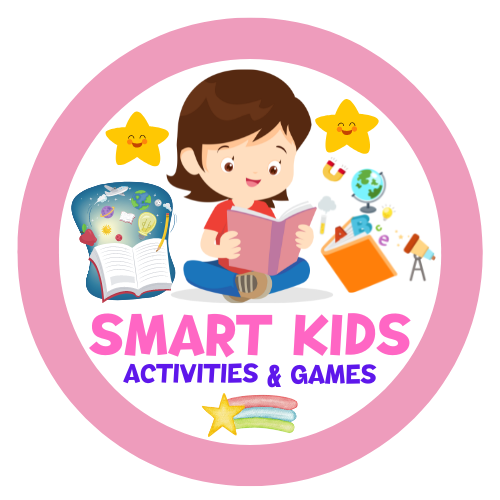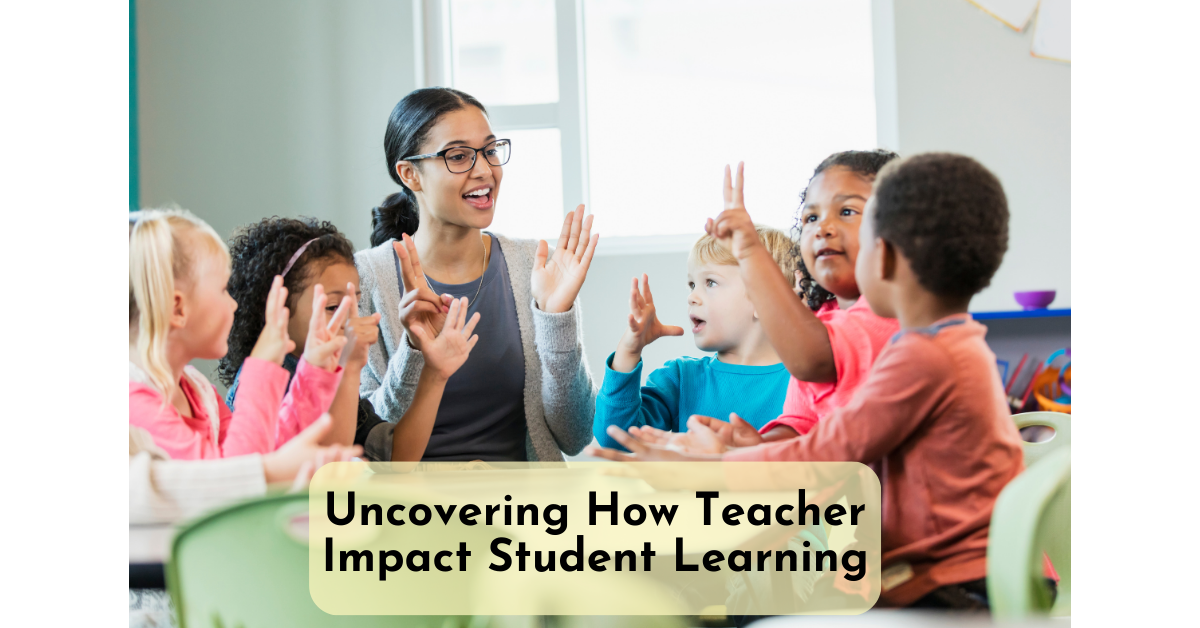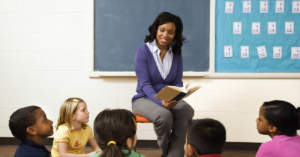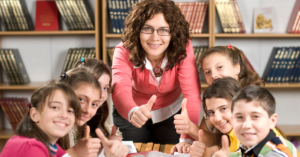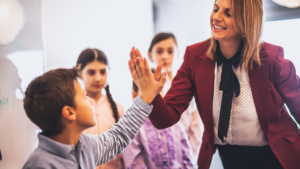Key Takeaways:
- Teachers play a crucial role in shaping student learning outcomes and academic success.
- Teachers contribute to fostering student self-esteem and motivation.
- Research highlights the significant and lasting impact that teachers have on their students’ lives.
- Creating a nurturing and supportive environment is essential for teachers to leave a positive impact on students.
- Effective teaching strategies are key to maximizing the impact of teachers on student learning.
The Power of Teacher-Student Relationships
One of the key ways that teachers impact student learning is through the establishment of strong and positive teacher-student relationships. These relationships create a sense of belonging and connection, which enhances student engagement in the learning process. Research has shown that students who have supportive relationships with their teachers are more likely to be motivated, perform better academically, and have higher levels of self-esteem. Teachers who take the time to understand their students’ individual needs, provide emotional support, and create a safe and inclusive classroom environment significantly contribute to student learning and development. When teachers build strong relationships with their students, a bond of trust and respect is formed. This bond motivates students to actively participate in their learning journey and take ownership of their education. Students feel comfortable asking questions, expressing their ideas, and taking risks in the classroom, knowing that their teacher supports and values their efforts. The teacher-student relationship also plays a vital role in addressing students’ emotional and social needs. Teachers who maintain open lines of communication, listen attentively, and provide guidance and encouragement foster a supportive environment where students feel understood and cared for. This emotional support helps students navigate through challenges and overcome barriers to learning, ultimately leading to improved academic performance.“A good teacher can inspire hope, ignite the imagination, and instill a love of learning.” – Brad HenryMoreover, teacher-student relationships can have a lasting impact on students’ social and emotional development. When students feel connected to their teachers, they develop a sense of belonging and develop positive social skills. This, in turn, improves their ability to collaborate with peers, solve problems, and resolve conflicts in a constructive manner. In order to foster strong teacher-student relationships, teachers can implement various strategies. These may include getting to know their students on a personal level, showing genuine interest in their lives and experiences, and providing opportunities for one-on-one interactions. Creating a safe and inclusive classroom environment where diversity is celebrated also contributes to positive relationships and student engagement in learning.
The Impact of Teacher-Student Relationships
The impact of teacher-student relationships extends beyond the academic setting. Research has shown that positive relationships with teachers can lead to long-term benefits such as increased educational attainment, higher career aspirations, and improved overall well-being. Students who have experienced positive teacher-student relationships throughout their educational journey often attribute their success to the support and guidance they received from their teachers. In conclusion, the power of teacher-student relationships cannot be understated. Building strong relationships with students creates a foundation for meaningful learning experiences and enhances student engagement. By prioritizing positive connections, teachers have the ability to shape not only their students’ academic success but also their personal and social development.| Benefits of Strong Teacher-Student Relationships | Impact on Student Learning |
|---|---|
| Increased motivation to learn | Enhanced student engagement |
| Improved academic performance | Higher achievement levels |
| Enhanced self-esteem and self-confidence | Positive attitude towards learning |
| Development of positive social skills | Better collaboration and problem-solving skills |
| Long-term educational and career benefits | Improved overall well-being |
Effective Teaching Strategies for Student Learning
Teachers employ various teaching strategies to facilitate student learning. By utilizing effective teaching strategies, educators can create engaging and dynamic classroom environments that promote student growth and understanding.Differentiated Instruction
One effective teaching strategy is differentiated instruction, which involves tailoring instruction to meet the diverse needs of students. By recognizing that each student is unique and has different learning styles, abilities, and interests, teachers can provide individualized support and opportunities for success. This approach ensures that every student can access and comprehend the material, leading to improved learning outcomes.Engaging and Interactive Teaching Methods
To foster active student participation and critical thinking skills, teachers should employ engaging and interactive teaching methods. Cooperative learning encourages collaborative problem-solving and teamwork, while inquiry-based learning promotes curiosity and independent thinking. Project-based learning allows students to apply their knowledge and skills to real-world scenarios, making the learning process more meaningful and relevant.Hands-on Activities and Technology Integration
Incorporating hands-on activities and technology into the classroom can greatly enhance student learning. Hands-on activities provide students with tangible experiences, allowing them to actively explore and manipulate objects or materials. This approach fosters deep understanding and retention of concepts. Integrating technology, such as interactive educational software, online resources, and multimedia presentations, can make learning more engaging and accessible for students.Effective teaching strategies, such as differentiated instruction, engaging and interactive teaching methods, hands-on activities, and technology integration, are key to promoting student learning and academic success.
The Impact of Teacher Effectiveness on Student Achievement
Teacher effectiveness plays a crucial role in determining student achievement and academic success. Numerous studies have consistently shown that highly effective teachers have a significant positive impact on student outcomes. Highly effective teachers possess strong content knowledge and pedagogical skills, enabling them to effectively convey information and facilitate student understanding. They create a positive classroom climate that promotes engagement, motivation, and a love for learning. Using data-driven instruction, effective teachers continuously assess student progress, identify areas of improvement, and tailor their teaching strategies accordingly. They provide timely feedback to guide student growth and implement evidence-based practices that have proven to be successful in facilitating student learning. Moreover, effective teachers understand the importance of ongoing professional development and engage in reflective practice. They seek out opportunities to refine their teaching methods, stay updated on the latest research and educational trends, and constantly strive to improve their instructional techniques. By recognizing and supporting the growth and development of teachers, we can enhance their effectiveness in promoting student learning. Providing them with the necessary resources, mentorship, and professional development opportunities ensures that teachers are equipped with the tools they need to make a lasting impact on their students’ academic achievement.The Educational Impact of Teachers on Student Success
Teachers play a critical role in shaping student success and learning outcomes. They create a conducive and stimulating learning environment that supports students’ intellectual, social, and emotional growth. Through effective instruction, personalized attention, and support, teachers can significantly improve student outcomes. Engaging and motivating students are vital elements of teachers’ educational impact. By providing constructive feedback and setting high expectations, teachers empower students to strive for excellence. Research consistently shows that skilled and dedicated teachers positively influence student achievement. They contribute to higher graduation rates and better college readiness among students.The Power of Teacher-Student Relationships
One of the key ways teachers impact student learning is through the establishment of strong and positive teacher-student relationships. These relationships create a sense of belonging and connection, leading to increased student engagement in the learning process. Research has shown that students with supportive relationships with their teachers are more motivated, perform better academically, and have higher self-esteem. Teachers who take the time to understand their students’ individual needs, provide emotional support, and create a safe and inclusive classroom environment significantly contribute to student learning and development.Effective Teaching Strategies for Student Learning
Teachers employ various teaching strategies to facilitate student learning. Differentiated instruction allows teachers to tailor their instruction to meet the diverse needs of their students, ensuring that each student can access and comprehend the material. Engaging and interactive teaching methods, such as cooperative learning, inquiry-based learning, and project-based learning, promote active student participation and critical thinking skills. Hands-on activities and the use of technology make learning more tangible and relevant to students, increasing their motivation and understanding of concepts.The Impact of Teacher Effectiveness on Student Achievement
The effectiveness of teachers has a direct impact on student achievement. Highly effective teachers improve student outcomes and academic performance. They possess strong content knowledge, pedagogical skills, and the ability to create a positive classroom climate. Effective teachers use data-driven instruction, provide timely feedback, and implement evidence-based practices. Teachers who engage in reflective practice and continuous professional development are more likely to positively impact student achievement.The Lifelong Influence of Teachers
The influence of teachers extends far beyond the duration of a student’s time in their classroom. Positive experiences with teachers, characterized by support, encouragement, and belief in a student’s potential, have a profound impact on their self-esteem, confidence, and motivation to succeed. Having a nurturing relationship with at least one caring adult, often a teacher, is a critical factor in student success.| Student Outcomes | Graduation Rates | College Readiness |
|---|---|---|
| Increase in academic achievement | Higher likelihood of graduating on time | Better prepared for college |
| Improved self-esteem and confidence | Lower dropout rates | Higher standardized test scores |
| Enhanced critical thinking skills | Increased postsecondary enrollment | Successful transition to college |
Unveiling the Profound Ways Teachers Impact Student Lives
Teachers impact students’ lives in numerous profound ways. They create a supportive and inclusive learning environment, foster positive attitudes towards learning, and empower students to reach their full potential. Teachers serve as role models and mentors, guiding students not only in academic pursuits but also in essential life skills and personal growth. By nurturing students’ passions, strengths, and interests, teachers contribute to their overall development and well-being. The impact of teachers goes beyond academic achievements, as they provide a source of inspiration, guidance, and support that can positively shape students’ lives for years to come.The Lifelong Influence of Teachers
The influence of teachers extends far beyond the duration of a student’s time in their classroom. Teachers have the power to create indelible memories that persist throughout a student’s life and shape their personal and professional trajectory. Positive experiences with teachers, characterized by support, encouragement, and belief in a student’s potential, can have a profound impact on their self-esteem, confidence, and motivation to succeed. Research indicates that having a close and nurturing relationship with at least one caring adult, often a teacher, is a critical factor in student success. Teachers play a vital role in inspiring, motivating, and guiding students, leaving a lasting imprint on their lives. Their influence goes beyond academic achievements, as they contribute to the development of essential life skills and personal growth.Impact on Self-Esteem and Confidence
Teachers who provide support and believe in their students’ abilities help to build their self-esteem and confidence. By acknowledging and nurturing their strengths and talents, teachers empower students to believe in themselves and their potential. This positive reinforcement can have a lifelong impact, allowing students to overcome challenges and pursue their goals with confidence.Motivation to Succeed
Teachers who inspire and motivate their students create a drive and passion for learning. By making education enjoyable, relevant, and engaging, teachers instill a love for learning that can last a lifetime. Through their enthusiasm and dedication, teachers encourage students to explore their interests, set ambitious goals, and strive for success.“A good teacher can inspire hope, ignite the imagination, and instill a love of learning.” – Brad HenryTeachers serve as role models and mentors, demonstrating the value of hard work, perseverance, and resilience. By guiding students through challenges and providing guidance, teachers equip them with the skills and mindset needed to navigate life’s obstacles with determination and confidence. In conclusion, the impact of teachers on students’ lives extends far beyond the classroom. Their support, encouragement, and belief in their students’ abilities can shape their self-esteem, confidence, and motivation to succeed. By inspiring, motivating, and guiding students, teachers leave a lasting imprint that influences their personal and professional growth throughout their lives.
Unveiling the Profound Ways Teachers Impact Student Lives
Teachers play a pivotal role in shaping the lives of their students. They have a profound impact on their overall development and well-being. Let’s explore the various ways in which teachers make a difference in the lives of their students.Fostering a Supportive and Inclusive Learning Environment
Teachers create a nurturing and inclusive environment where students feel safe and valued. By fostering a positive classroom atmosphere, teachers empower students to express themselves, share their opinions, and take risks in their learning. This inclusive environment not only enhances academic performance but also promotes the social and emotional growth of students.Instilling Positive Attitudes Towards Learning
Teachers inspire students by instilling a love for learning. They encourage curiosity, critical thinking, and a growth mindset. By creating engaging lessons, teachers make learning enjoyable and relevant, igniting a lifelong passion for knowledge. Through their enthusiasm and dedication, teachers motivate students to overcome challenges and strive for excellence.Guiding Students as Role Models and Mentors
Teachers serve as role models and mentors for their students. They not only impart knowledge but also guide students in developing essential life skills and character traits. Teachers provide guidance, support, and encouragement, helping students navigate challenges and make informed decisions. These mentorship relationships can have a lasting impact on students’ personal and professional growth.Nurturing Students’ Passions and Strengths
Teachers recognize and nurture the unique passions and strengths of each student. They provide opportunities for students to explore their interests, develop their talents, and pursue their aspirations. By fostering a sense of purpose and self-belief, teachers empower students to unlock their full potential and achieve their goals.Inspiring, Guiding, and Supporting Students’ Lives
Teachers go beyond academic achievements and provide inspiration, guidance, and support that can shape students’ lives for years to come. They encourage students to dream big, set goals, and believe in themselves. Teachers celebrate successes, offer a shoulder to lean on during difficult times, and provide invaluable life lessons that extend far beyond the classroom.Conclusion
Teachers play a vital role in the educational impact on students’ lives, influencing their learning outcomes and overall development. They go beyond classroom instruction, creating memories, offering guidance, and shaping the trajectory of students’ lives. The impact of teachers extends far beyond academic achievements, encompassing crucial aspects like fostering self-esteem, motivation, and personal growth. Effective teaching strategies and positive teacher-student relationships are key factors in enhancing student engagement and achievement. By employing differentiated instruction, interactive teaching methods, and leveraging technology, teachers create a stimulating learning environment that caters to diverse student needs. The establishment of strong teacher-student relationships builds a sense of belonging, promoting student motivation and overall engagement in the learning process. Recognizing the profound influence of teachers on students, it is essential to value and support their growth. Providing professional development opportunities and resources enables teachers to continuously improve their effectiveness in the classroom. By investing in teachers, we invest in the future success of our students and society as a whole, ensuring that the educational impact of teachers continues to shape the lives of students for generations to come.FAQ
How do teachers impact student learning?
Teachers have a significant impact on student learning through the establishment of strong teacher-student relationships, creating a sense of belonging and connection that enhances student engagement in the learning process.
What are some effective teaching strategies for student learning?
Effective teaching strategies include differentiated instruction, engaging and interactive teaching methods, hands-on activities, and the use of technology.
How does teacher effectiveness affect student achievement?
Research shows that highly effective teachers can significantly improve student outcomes and academic performance by possessing strong content knowledge, pedagogical skills, and the ability to create a positive classroom climate.
What is the educational impact of teachers on student success?
Teachers play a critical role in shaping student success and learning outcomes by creating a conducive and stimulating learning environment that supports students’ intellectual, social, and emotional growth.
How do teachers impact students’ lives beyond their academic achievements?
Teachers can create indelible memories that persist throughout a student’s life and shape their personal and professional trajectory by providing support, encouragement, and belief in their potential.
In what ways do teachers impact student lives?
Teachers impact student lives by creating a supportive and inclusive learning environment, fostering positive attitudes towards learning, and empowering students to reach their full potential.
What is the significance of teacher-student relationships?
Teacher-student relationships create a sense of belonging and connection, enhancing student engagement in the learning process and promoting motivation, academic performance, and self-esteem.
What is the overall impact of teachers on student learning outcomes?
Teachers have a profound impact on student learning outcomes, shaping their academic success, graduation rates, and college readiness through effective instruction, personalized attention, and support.
How can we support the growth and effectiveness of teachers?
Supporting the growth and effectiveness of teachers can be achieved through providing professional development opportunities and resources to continuously improve their instructional practices.
Download free activities and teaching resources Click Here
You may also be interested in
AI in Kids Education: Trends & Benefits
The Importance of Teacher-Student Relationships
Handling Difficult Student Behavior: 10 Tips & Strategies
The Importance of Parent-Teacher Collaboration
Navigating the Teacher-Student Relationship Dynamics
Effective Strategies for Teaching Student Success
Source Links
- https://www.ldonline.org/ld-topics/teaching-instruction/impact-teachers-story-indelible-memories-and-self-esteem
- https://www.weareteachers.com/teacher-impact-statistics/
- https://medium.com/inspired-ideas-prek-12/the-impact-of-a-great-teacher-ae5cbe3c6e22

